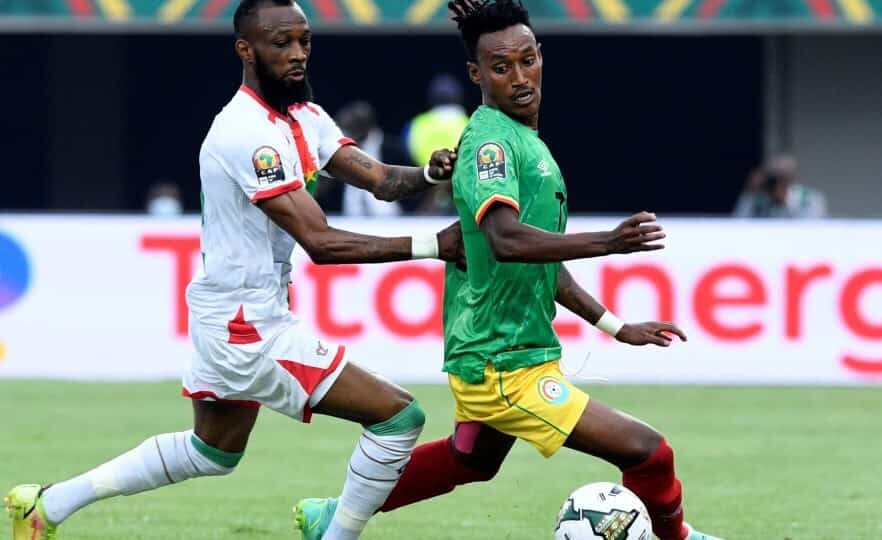 Ethiopia kicks off its African Cup of Nations campaign on January 9 in Cameroon. The national team seeks to rally the country behind them, as the Horn of Africa nation faces its worst crisis in decades.
Ethiopia kicks off its African Cup of Nations campaign on January 9 in Cameroon. The national team seeks to rally the country behind them, as the Horn of Africa nation faces its worst crisis in decades.
Ethiopian national team players sang and chanted together inside the team’s dressing room just days before their Africa Cup of Nations (AFCON) campaign kicks off this Sunday.
With the very existence of Ethiopia seemingly at stake amid political and ethnic chaos, the country’s soccer team nicknamed the Walyas is havingthe effect of pulling the country together again as it draws on players from all over Ethiopia, including those from the troubled regions of Tigray, Oromia, and Amhara. As a result, the team hopes to bring joy to a troubled nation.
The expectation is always at a fever pitch among Ethiopian fans whenever the national team plays. But this time around, the pressure has been given an extra dimension for their latest appearance at Africa’s top tournament.
Ethiopia is still reeling under the tension and division that has erupted into a civil war in the northern region of Tigray.
Pressure on and off the pitch
Ethiopia’s footballing history is littered with extreme highs and lows on and off the pitch. Walyas coach Wubetu Abate is acutely aware of the current pressures felt by his team off the pitch.
He regrets that some observers have chosen to highlight the differences in ethnicity and speculate why particular players are not in the squad.
“Some people at home would like to make links between the political troubles and the team,” Wubetu told DW, stressing that such utterances are only opinions and do not reflect the squad.
“The team and I don’t think like that. We feel strong, we are all Ethiopian, and we are here to represent Ethiopia,” Wubetu said in an exclusive interview.
 Ethiopia’s national football team coach Wubetu Abate says ethnicity is no issue in the squad
Ethiopia’s national football team coach Wubetu Abate says ethnicity is no issue in the squad
A symbol of Ethiopia’s unity
The Ethiopians were one of the earliest teams to arrive in the host nation Cameroon, having already been there almost two weeks before the tournament’s start. Wubetu says that the atmosphere in their base camp in Yaounde is excellent.
“They sing together when they are together. When the players sing and move together, it is representative of Ethiopian unity,” Wubetu said, emphasizing that although there are so many of them, they are united as one.
“We are in this tournament; we have come through a lot of difficulties. So, even being here [at the AFCON finals] is already a great victory. Being at this tournament is even more important, so that we can show off the image of Ethiopia.”
 Ethiopian National Defense Forces have battled Tigrayan fighters for more than a year
Ethiopian National Defense Forces have battled Tigrayan fighters for more than a year
The effect of COVID-19 on AFCON
The 33rd Africa Cup of Nations in Cameroon was delayed by a year due to the coronavirus pandemic. The Walyas had hoped they could play several warm-up matches, but COVID-19 restrictions prevented all but one of those games from taking place.
In that friendly match against Sudan, Ethiopia claimed an exciting 3-2 victory. The winning goal came from Tigrayan center forward Amanuel Gebremichael, a player who had previously lost his place in the national team when the civil war broke out.
“When the civil war broke out, the Ethiopian Football Federation gave the Tigrayan-based players the chance to move to clubs elsewhere in Ethiopia,” Michael Legese, a sports journalist at Soccer Ethiopia, told DW.
After moving from Tigrayan side Mekele to St. George club in Addis Ababa, Wubetu decided to recall the 22-year-old striker despite having had an underwhelming Ethiopian Premier League season. “Because of that, some questioned why he was brought back to the national side,” sports journalist Michael said.
Trainer Webatu rejected the objections and his gamble paid off when Amanuel scored twice against Sudan.
“Selection for Ethiopia’s national team is not a quota system based on ethnicity. It is based on performance,” Michael said. For him, the most decisive element in the squad is its togetherness.
Former Walyas coach and current Secretary-General of Ethiopia’s Football Federation Sewnet Bishaw told DW that ethnic tension has never had any significance in the team.
“When players represent Ethiopia, their ethnicity is of no importance at all. The players are not interested in ethnicity. Instead, they talk of unity and of advancing the team as far as possible,” Sewnet said, recalling that while as coach of the Ethiopian team, he aimed to give joy to the Ethiopian people.
“I am not a politician. So these problems of ethnicity never existed within the team.”
 The AFCON tournament takes place in Cameroon as the country and continent grapples with the COVID-19 pandemic
The AFCON tournament takes place in Cameroon as the country and continent grapples with the COVID-19 pandemic
Backing from the diaspora
Former national team defender Girma Sahle, who played for Ethiopia in the 1980s, agrees with Sewnet’s assessment on unity. He now lives in France and is part of the extensive Ethiopian diaspora.
“When the players see the Ethiopian flag in the stadium, they will be thinking about how they are representing 130 million Ethiopians,” Girma told DW.
“It’s not about whether I come from this region or that one. At this time, all Ethiopians, particularly those living outside of Ethiopia, have come together to support the country.”
France-based Ethiopians have borrowed the French national football team’s rallying cry ‘allez les Bleus’ — ‘come on blues’, adapting it to ‘allez les Walyas!’
As such, Ethiopia’s football team is already playing its part in reconciliation.
This article was adapted by Chrispin Mwakideu
Edited by: Maximilian Merrill
DW

















